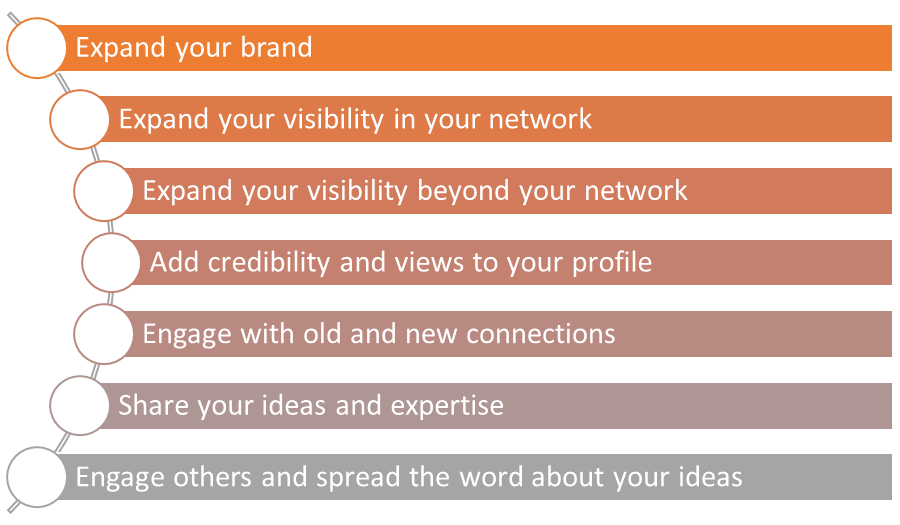
The time is now. We want to hear your voice says Julia Schmidt
What is a Thought Leader?
A thought leader is someone who inspires others with innovative ideas, can turn these ideas into reality, and enables sustainable change. Thought leaders create a dedicated team of friends and followers who help them scale up their ideas to the world. They are known and recognized by their expertise in a special field and are often asked to speak at public events, conferences or webinars to share their innovative ideas with a relevant audience.
As Guy Kawasaki says, “true thought leaders have expertise, passion, and a track record of changing the world. They become thought leaders when they rise themselves by sharing their knowledge so that others can change the world, too.”
Why do we need Thought Leaders?
Today, we have the privilege of having many thought leaders advocating for the administrative profession and showing to the world that our work is not only a job, but a profession with one voice. They are professionals who made their own transition from leaders to thought leaders. They are influencing not only the way others perceive our profession, but also the way we see our profession ourselves. Our role, as followers, is to push them to keep having a positive impact in arenas that matter to them – and us – and empower the legacy they are leaving behind after they move on.
What I have witnessed over the past five years is that these thought leaders have elevated our profession to new levels, not only by accomplishing and achieving career and personal satisfaction, but also by ultimately increasing the visibility of the administrative profession nationally and internationally.
In her book Ready to Be a Thought Leader? How to Increase Influence, Impact, and Success, Denise Brosseau says that “thought leadership is not about being known; it is about being known for making a difference.” So, having these words in mind, I want you to think about all thought leaders – those credible role models, reliable authorities and influencers – who are part of your career journey, and make a difference in your life. Now, take some time to answer the question “why do we need thought leaders?”
Creating a Significant Impact
Thought leaders are needed. As Jim Rohn, an American entrepreneur, author, and motivational speaker, said: “all good men and women must take responsibility to create legacies that will take the next generation to a level we could only imagine.” So, we need your voice, whatever issue you are tackling or working to resolve, whatever arena you choose to educate and inspire others. We need your passion and innovative ideas! I want to empower you to embrace the “thought leadership call”. We need your unique story!
In her book, Denise Brosseau, shares seven steps to thought leadership:
1. Find your driving passion
By focusing on your passion and interests, you will ensure commitment to shaping a better future.
2. Build your ripples of influence
By listening to the opinions of your stakeholders: colleagues, mentors, and friends you will be able to gather different perspectives that you can use in building your story and consequently get your first followers on board.
3. Activate your advocates
You will need to get more people onboard: community leaders, journalists, research groups, and national partners to gain more followers.
4. Put your “I” on the line
By stepping into the limelight and saying, “follow me”, you will build a sustainable momentum for an innovative idea.
5. Codify your lessons learned
By transforming your know-how into a replicable model so that others can feel motivated and empowered, you will allow others to follow your footsteps.
6. Put yourself on S.H.O.U.T
By spreading the word about your initiatives, efforts, accomplishments, and lessons learned, you will allow others to connect with you and build on your ideas.
7. Incite (r)evolution
By accelerating and amplifying your voice, you will increase your influence and impact, and build a community of followers who will ensure that your ideas become known locally, regionally, nationally, and internationally.
Thought leadership is not something you create in one go; it is a learning process. You learn by:
- listening to people,
- understanding your industry and profession,
- combining humility, honesty, and appreciation,
- observing and connecting information and
- creating ideas that are informed by the marketplace.
It takes a lot more than some blog posts, social media engagement or networking events to transform yourself into a reliable expert in any field. Knowledge, insight and valuable perspective are the foundations that will give you a thought leadership status. Start by building your experience and gain the necessary credibility, over the long-term, to become an expert with a voice, an expert that influences others. How? Keep the following in mind:
- focus on what you know best,
- talk and write about your passions,
- be a sharer of ideas, and
- get published as often as possible.
Blogging on LinkedIn
The objective of this article is not to convince you to become a LinkedIn fan. I only want to encourage you to become a thought leader. However, blogging on LinkedIn offers everyone the chance to become a writer, share innovative ideas, empower others and be a voice for the profession. Here’s my story of engaging within my ecosystem, sharing best practices, collaborating with peers and nurturing relentless curiosity.
I published my first article in October 2014. Today my publishing results show that I have authored 98 articles, many of them with more than one thousand views:
- 10 Tips to Make You an Emotionally Intelligent Executive Assistant – 2,424 views
- Is Your Boss Wearing Prada or Are You Wearing Chanel!? – 5,683 views
- 100 Tips for Becoming A Successful Executive and Personal Assistant – You Are Your Success – 1,739 views
- How to Write Your Self-Evaluation – 1, 744 views
- Ten Tips to Help Assistants Deal with Tough Bosses – 4,109 views
- Things Executive Assistants Are Doing to Demonstrate Their Leadership Ability – 2,649 views
- Great Executive Assistants Communicate, Communicate & Communicate – 1,570 views
Over the years, I have received regular positive feedback from the administrative profession community. I have also built many new significant relationships with other professionals; many of whom have become co-writers and interviewees. I have gained 4,200 followers; many of whom are not connections, but professionals who enjoy reading my posts. Further, I mentor people via LinkedIn, with the reciprocal effect of learning from their stories as well. I now realize that my followers also care about what I care about, which creates deeper, meaningful conversations.
Stories are the way we learn
Denise Brosseau
The Benefits of Blogging
LinkedIn is my preferred blogging platform for sharing my stories. It is completely free if you create a LinkedIn profile. It allows me to have everything within one platform: my professional online profile, my published articles and shared posts, my connections (peers, colleagues, and experts), and future readers.
The best way to use LinkedIn Publisher is by posting a valuable article and picking a great thought leadership topic for your brand that will engage your followers and community. It is the best way to get people’s engagement.

Adapted from the book LinkedIn for Personal Branding: The Ultimate Guide by Sandra Long
Many studies show that the longer posts are, the more often they are shared. I do not think about the number of words, but focus on what I want to say, and how I want to tell my story to others. I write to an audience represented by administrative professionals. However, many friends and colleagues who are not in the profession often say that what I write also resonates with them. Writing my articles as a blogger on LinkedIn allows me to apply my creativity and writing skills, and to share my thoughts with a wide audience.
What I am Sharing
I usually share experiences from my personal journey: articles that focus on communication between assistants and executives, improving the quality of our 1:1 meetings, working with thought leaders, accelerating our own onboarding process, writing self-evaluations, the value of participating in conferences and professional association membership, and my tips on how to be #TheBestAssistant. I understand that it is necessary to show others how a sustainable career pathway can be built. By telling my stories, I am building connections, impacting the way others work, and engaging people in believing in and aligning with my ideas.
Getting the support of peers and experts is important! I also invite other professionals to co-write and comment on my articles before I publish them.
Through my articles, I want to give a voice to others, promote the administrative profession and help us shape a better future. I am very thankful for the peers, mentors, and mentees who have helped me develop my ideas into readable stories.
What if we all could invent a possible future and be part of making it a reality?
I charge you all to take action and embrace your thought leadership by envisioning how you can contribute to shaping the future.
With that in mind, answer these questions:
- What future am I committed to making happen in our profession?
- What future do I stand for? What will I work to eradicate?
- What must no longer be allowed to happen?
- What do people not know yet about our profession that they must be informed about?
- What amazing transformations have already occurred that need to be shared nationally and internationally?
- What new ways of doing things have I created, or learned, that would benefit others?
- What legacy do I want to leave?
In defining your areas of expertise, you should think about:
- The subjects you like to write about
- The successes you are most proud of
- Your core professional skills and personal attributes
- What you know that others may not
- The areas in which you are considered a leader
- The innovative ways you do things
- The subjects you have written about for publications
Using Analogies
What about building an article based on analogies from a famous movie? I did it in 2015 in one of my first articles created specifically for being published on LinkedIn.
Making good analogies from popular films is an effective approach to storytelling in public speaking and writing. Just pick a film scene that conveys your message and tell it!
My article Is Your Boss Wearing Prada or Are You Wearing Chanel? was based on the great comedy-fashion movie The Devil Wears Prada with the famous Meryl Streep as Miranda Priestly, the editor-in-chief of Runway, and Anne Hathaway as Andrea Sachs. When I wrote the article, I combined two of my passions: writing and cinema.

The analogy helped readers to better understand my main point, which was building strong partnerships with our managers. I gained many readers and followers from this article. It was the first time I really understood the importance of having reader, peer, and expert support. It shows an alignment with current trends and topics that hold mass appeal. This was my first experience with the power of being heard.
A Call to Action
Publishing on LinkedIn has been professionally rewarding and a commitment to life-long learning. It has been one of the best ways for me to share my most poignant insights. Being a thought leader has become part of my career journey, confirmed by loyal friends, colleagues, and teammates. I am sure many of you are putting your “I” on the line by stepping into public speaking and sharing your lessons learned through books and articles. That is great! But, for those of you who have yet to embrace the thought leadership call, my message to you is you can do it!
I hope this article will inspire, motivate and excite you. However, if you prefer being a supporter-advocate, I want to assure you that we NEED your support. You are part of the future we are shaping for our profession as well.
Thought leaders are just like anyone else; but they also have an inherent uniqueness: they stand out and share their ideas, they are storytellers and foster long-lasting relationships.
I often end my articles either with a call to action or a motivational sentence. Here is my final message: Why not start practicing your thought leadership skills today? The time is now, and we want to hear your voice.
More people with an informed point of view speaking up and speaking out will make a difference for us all
Denise Brosseau













